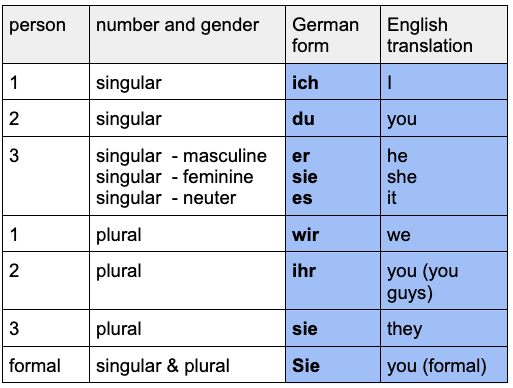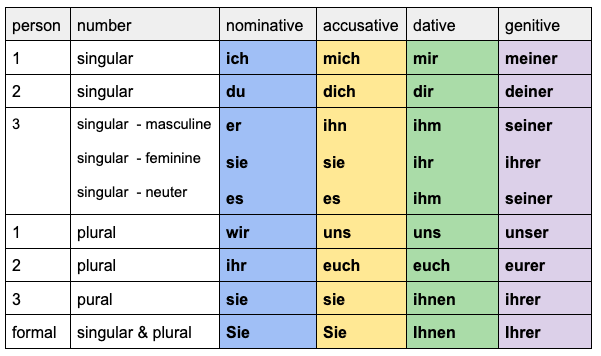What are personal pronouns?
We use personal pronouns to replace and talk about already mentioned things, or people. They represent the person, people, animal or thing that is performing. In general, we can refer to four different persons or forms:
- First-person (when I am included: I, we)
- Second person (someone we’re directly talking to: you, you guys)
- Third-person (someone external we’re not talking to at the moment: he, she, it, they)
- Polite form (when you’re talking to a stranger in a formal situation: you)

In English, there is the same word for du, ihr, and Sie.
– du / ihr = informal, familiar (used with friends, family, people you know well)
– Sie = formal (used with strangers and for formal situations)

What information do personal pronouns contain?
In English, there is the same word for du, ihr, and Sie.
Personal pronouns contain
- a gender: masculine, feminine, neuter
- a number: singular, plural
- a case: nominative, accusative, dative, genitive
In German, they need to be declined. That means, they change the form when they change from subject to object.
Example:
How do you decline personal pronouns?
Personal pronouns need declension. The form changes depending on the case: nominative, accusative, dative, genitive. The genitive case is rarely used for personal pronouns so I will only show the three most important cases:

In all of the three sentences, the pronouns “ich”, “mich”, and “mir” are referring to me, Carolin, but the declension changes depending on the case.
- In the first sentence “Ich bin Carolin”, “Ich” is nominative because I am the subject. The subject always needs a nominative.
- In the second sentence, we have two parties: “Du” (you) and “mich” (me). “Du” is the subject, “mich” is the object. In this situation, I am the accusative, so I say “mich”.
- In the third sentence “Du sprichst mit mir”, “Du” (you) is the subject, “mir” (me) is the object. On some occasions, we need to decline “me” as “mir”. It depends on the verb and several prepositions. In this case, it’s because the German preposition “mit” always requires a dative case.
- The genitive form is rarely used for personal pronouns. You might find it in old or poetic texts.
You can see that German declension depends on many factors such as the verb or the preposition.
Here is a table of all the personal pronouns in their specific case.

How do you use personal pronouns?
Personal pronouns in the first person (ich, wir) are used when we’re talking about ourselves

Talking directly to other people, we use the personal pronouns in the second person (du, ihr) or the polite form (Sie).

Personal pronouns in the third person er, sie, es usually replace a noun you mentioned before. It can be a human being, but also a thing or an animal. Gender is ALWAYS important and needs to be adjusted.

In the picture, you can see that even though we’re talking about a thing, an animal or a human being such as a tree, a cat, and a baby you’re pointing to them as “er” for the tree, “sie” for the cat and “es” for the baby. It’s because of their gender. Whenever it’s masculine, it’s “er”, feminine “sie”, and neutral “es”. The computer in German is masculine, so we say “er”, and the church is feminine so it’s “sie”.
In general, using a personal pronoun requires that the other person knows what you’re talking about. It has to be shown or mentioned before.
Example:
- Kannst du den Mann sehen? Er ist dort.
Can you see the man? He’s over there. - Der Computer funktioniert nicht mehr. Ich habe ihn vor 2 Jahren gekauft.
The computer is not working anymore. I bought it (“him”) two years ago. - Die Kirche ist neu. Sie wurde letztes Jahr gebaut.
The church is new. It (“She”) was built last year. - Das Buch ist interessant. Ich habe es aus dem Bücherladen.
The book is interesting. I got it from the bookstore.
The pronoun “es”

Summary
- Personal pronouns replace people, animals, or things.
- You use them to not always say their names.
- Like nouns, they need to be declined in gender, number, and case.
- Personal pronouns in genitive are rarely used. The most important cases are nominative, accusative, and dative.